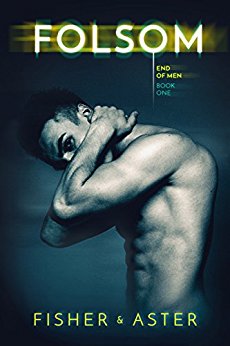
I’m unfamiliar with Willow Aster, but I adore Tarryn Fisher. In a genre of paint-by-numbers stories, I wasn’t expecting Olivia when I first picked up The Opportunist a few years ago. It floored me. Shortly after, Fisher’s Mud Vein devastated me. Every time I read her work she inspires me to stop fucking around and write. She writes damaged, flawed characters that are intensely relatable because instead of the flowery, perfect lead-heroine types, she creates us, without apologies.
It deeply pains me to say it, but Folsom, a debut series novel written by Fisher and Aster, is a wreck. This is a dystopian novel that takes place in an indeterminate future, where technology is advanced enough to create virtual/augmented reality simulations and comm devices that are far more advanced than where we are today, but somehow science is failing the In-Vitro Fertilization game. Men, through apparent war (mass devastation and nuclear war is mentioned but never shown or explained) have either died off or become sterile, leaving only 12 virile men in what is left of the United States (United Regions? States no longer exist—again, unexplained) to repopulate the country. They are lauded and idolized but are given no choices about who they screw and are expected to perform at least three times (so-called “appointments”) a day. Enter our heroine, Gwen. She had a dream about a baby when she was 12, and after telling her mother, they’ve been determined to make it a reality ever since. Being well connected and thus able to schedule an appointment, she and her inexplicably catty sister have appointments with Folsom on the same day, each getting pregnant, and Gwen of course, getting the boy. During her appointment however, she learns of Folsom’s performance expectations and lack of choices. She’s appalled to learn that he usually needs pills to have sex with women and that he gets no choice or option to say no. Thus, begins the impetus of the story. Freedom of choice, freedom of speech, and the freedom to love are the ideals here, all of which are being curbed by corrupt women.
I did not realize that we needed a Handmaid’s Tale for men.
This book triggered many of my sacred cows, and that doesn’t surprise me—I enjoy being challenged by authors. This just felt completely derived from Margaret Atwood’s work, much like All Lives Matter is derived from Black Lives Matter. In this, I feel like someone watched The Handmaid’s Tale and thought, “Yeah, well, men’s sex choices matter too!” Yes of course they do, but that’s not the point, is it? The authors made sure to acknowledge the plight of women before the “End of Men” several times, but the only women who seem to do so are the ones defending the enslavement of the 12 for the “greater good” of humanity.
Our heroine is clear that she wants the End Men program to stop because it’s the humane thing to do…but she has her boy baby and is in love with one of the End Men. Her motivations, as clearly as they are explained, are never sympathetic until much later when even more Handmaid’s Tale stuff happens. The character relationships aren’t very believable, and even more, women are written with very little sympathy. The governor is tyrannical without apparent cause, the sister is a hateful bitch without apparent cause, her own mother turns on her without apparent cause….and I’m over here, feeling personally betrayed because I know for a fact that these authors are women who promote supporting women. Instead, they are writing women who are the one-dimensional beasts that “I just get along better with men” women (as I once was) tend to believe. Where are the character layers? Where is the quality world-building? Hell, where is the steamy sex? I mean, at the base of all this is the desire to be turned on while I read and I’m not. I’m not moved in any way—
–except to write this.
